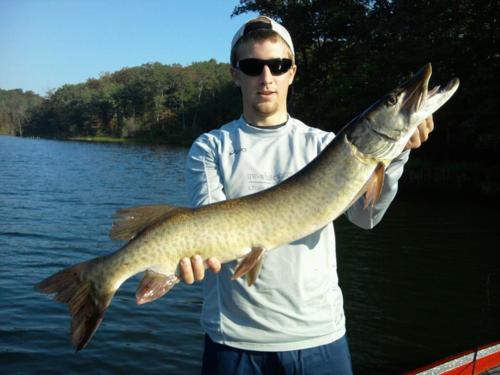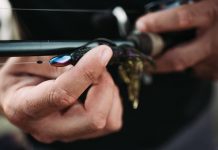
As the cold air and freezing temperatures begin rolling into much of the U.S., there are many things we, as fisherman, should be doing. The first is buying a winter home somewhere in Alabama, California or Florida so we can fish year-round (congrats if you already reside there). If that isn’t an option for you I have a plan B. Nothing is more critical than storing your fishing gear properly over the 2 to 4 months we have ice on our lakes. Taking the proper steps to have rods, reels and tackle winterized correctly can save you big bucks short- and long-term. In fact, you may even be able to save up for that second home down south!
Reels
The single most neglected item in a fisherman’s arsenal may be the most important: your reels. I’ve been fishing with folks in spring that take their first 20 casts and their reel sounds like a power drill! Needless to say, they didn’t take time to oil, grease and check the bearings before tossing them in a corner in their shed. It’s important to oil the moving parts and spool shafts of all your reels. I actually do mine a few times a year and then again before storage. Also, take off any bad/old line so you are forced to replace it in the spring. Line has a shelf life just like a gallon of milk (although a little longer), so make sure you replace it before its too late.
It’s also important to store reels separately from rods. Take them out of the reel seats and store on a dry, clean shelf that isn’t constantly exposed to light. You should also be sure to loosen the drag systems before putting them away. This commonly forgotten process can ruin drag systems since the springs are compressed for long times without use.
Rods
Once you’ve taken all of the reels off of the rods you should check all the reel seats and grips to assure there isn’t any damage to them and that repairs aren’t needed. Next, check your guides for cracks, chips, breakage or bends in the eyes. Replace any that need it and then go old school with a cotton swab on each one to see if there are any cracks. If any cotton is remaining there may be an inconsistency on that eye. I’m sure to check mine because God only knows how many times I’ve set the hook and hit a boat lift/dock, smoked Tyler or Paul (my fishing buddies) in the head, or smacked the side of the boat ripping a bait in! Be sure to replace rods that really need to be replaced. It’s usually a sound investment and they don’t always last a lifetime even with the best TLC. It’s always best to replace before they shatter in half!
Once the shaft and eyes are checked, clean and dry the entire rod. Be sure to focus on the cork handles so they don’t mold. Finally, store your rods flat on a shelf or floor if possible. It helps to cover them with Rod Slix so they don’t get scratched up and tangled. DO NOT lean them against a wall or with any unnecessary pressure on different parts of the rod. Keep them in a normal relaxed position to save on the backbone.
Tackle
Many people also skip the step of taking care of their tackle. This can be a costly mistake, and with the cost of lures nowadays, it’s not one we want to be making consistently. I try to clean and try out all of my trays at the end of the season before I store them for winter. This ensures there won’t be any rust build-up. Bull Frog makes many different products that reduce rust build-up in tackle boxes as well. I also try to cull out any old jigs, baits, hooks and other items that are no longer usable. Any lures, or in my case “lures”, that haven’t gotten wet in a few seasons should be sold, given away or stored elsewhere for future use.
After the trays have been cleansed of any old tackle you should double check all trebles on hard baits. Replace broken, dull and rusted trebles. With your spinnerbaits, be sure to remove all plastic trailers and damaged skirts. Check the split rings and hook points to make sure the baits are in top shape! Don’t be afraid to take a few hours to sharpen the hook points on these baits. It will greatly improve hook-up ratios.
Plastics can damage trays if they’re stored for too long and in the wrong conditions. The best way to have plastics keep well is to leave them in the original package or in another plastic, resealable bag. Try to keep colors separate to prevent bleeding of different colors and ruining them. Another tip is to put a few drops of attractant in them to keep that marinating throughout the off-season.
Odds and Ends
A few things to keep in mind with your other gear:
Fishing glasses should be kept in a hard case preferably inside a carrying bag within the hard case. By keeping them in that soft case the glasses will keep from bouncing around and scratching inside the hard case. Also, by casing them you keep the lenses out of the sunlight to help preserve the polarization.
Bump boards, hardware, cull clips, nets and other equipment with metal components should be kept in dry places to avoid rusting. Life jackets should also be kept in a similar place to keep from obtaining mildew and mold. They should be hung, along with rain gear, to keep them dry. Finally, your lake maps should be dried, folded and filed away for next years use, unless of course you’ve replaced them with all the hot spots found on Fishidy’s interactive maps. Oh, and if you’re planning on jiggin’ up some fish through the ice, make sure you keep your maps close by!
The Final Word
Your gear is an investment that can last a lifetime, especially when rod and reel combinations can run a bill north of $400. Plus, it’s hard to retire your favorite rod or reel because you didn’t take good enough care of it to last 10 to 15 years. The lifespan can be significantly lengthened by increasing the time spent on keeping them in top shape throughout the entire year.
Lastly, be sure to clean everything up once you’re finished. Failure to do so can result in a trip to the ER, a ticked off roommate, or a meeting with a marriage counselor when someone has a treble dug into their foot!
Hopefully, everyone who’s packing their gear away (and lives in this cold-weather climate) is also pulling out their flashers, jigging rods, tip-ups and ice augers! Good luck on the water…or ice!



